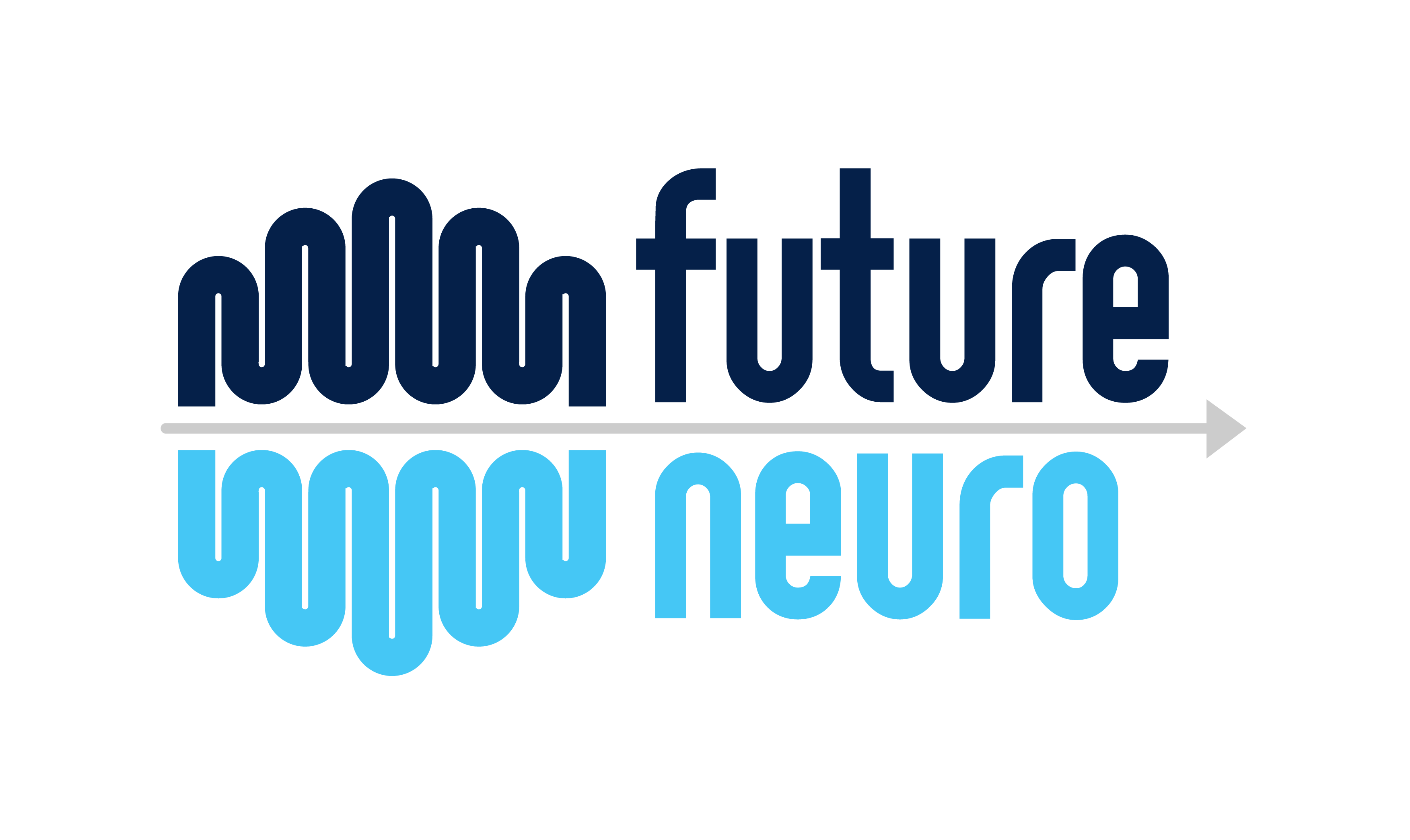Case Study 1: Establishing Brain Health Initiatives with Secondary Schools
Vision and Objectives: In line with our objective to embed brain health initiatives in Irish schools, FutureNeuro established connections with three identified schools from the SciFest panel. These schools included an all-girl city school, a rural midlands school and a West of Ireland school. Teachers from the three schools undertook to work with students to create brain health initiatives for National Science Week. FutureNeuro researchers offered the students lectures on their own personal and professional journeys into brain related research. Equally, FutureNeuro researchers offered to judge the initiatives in person in each of the schools. The objective of bi-directional engagement informed this process. The target groups were girls, rural school communities and schools who were not traditionally used to participating in National Science Week initiatives. FutureNeuro Researchers were equally targeted to share their knowledge and skills of Brain Health and secondly to adapt their own research journey for a school audience.
Inputs: A series of both in-person and virtual collaborative meetings were established with the EPE Lead, FutureNeuro Researchers, teachers and student representatives to establish what aspect of Brain health would be explored and how best to approach this. Where two of the schools focused on specific brain-related conditions, the third focused on therapeutic approaches for maintaining brain health. All schools were to receive a One for All Voucher and Certificates of Participation.
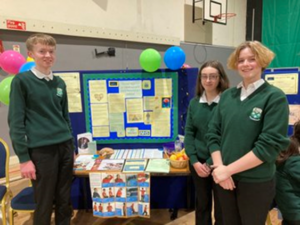
Students from Drumshanbo Vocational School exhibit their Brain Health Initiative at SciFest for National Science Week.
Outputs: The establishment of strong connections with the participant schools is a very positive output. Equally, this model established greater engagement with schools and SciFest and, as a consequence, school related STEM. It provided FutureNeuro Researchers with a platform to share their research journey with school students and staff. It also opened avenues for schools and FutureNeuro staff to collaboratively develop and deliver Brain Health Initiatives in education.
These connections will also be leveraged to support teachers and FutureNeuro Researchers to work collaboratively in the development and delivery of a Brain Health Series of Webinars which can be cascaded to students. Secondly, there is opportunity to collectively create educational tools in the process. Thirdly, schools will be invited to pilot the inclusion of brain related topics into the health and Wellbeing pillar of SPHE.
Outcomes and Evaluation: The creation of this collaborative initiative has enhanced staff capacity to appreciate the value of meaningful engagement with knowledge beneficiaries and service users in this instance school teachers and students. A roadmap has been established to build School STEM into FutureNeuro’s strategy and into individual research programmes. The initiative has affirmed the importance of ‘Bidirectional Engaged Research’ in the Center going forward, and has led to the identification of specific research topics and questions of great interest to teachers and students. We invited reflective feedback after each workshop and lecture, are recorded high rates of satisfaction. Typical qualitative quotes from school representatives included:
“Students found the researcher presentations very interesting and informative” (teacher)
“the students were encouraged to take more of an interest in this area of research and helped them realize that new discoveries are being made by Science Researchers all the time”.
Student feedback stated it was great to hear of researchers taking different career paths before engaging in active neurological research.
Equally, feedback from FutureNeuro staff who visited the school stated “It reinforced my belief that we should engage more with rural schools. The science teacher reported that a large proportion will not progress to third-level education”.
The success of this initiative will inform the running of the Brain Health initiative in Schools going forward.
Case Study 2: Running the CDKL5 Virtual Run and Talk
Vision and Objectives: The CDKL5 Virtual Run was the brainchild of Dr Omar Mamad. Omar has worked closely with the CDKL5 Alliance to establish meaningful public patient involvement and education and public engagement. The vision, in this instance, was to promote awareness, understanding and acceptance of the condition of CDKL5 and its impact on affected families. Further objectives included raising much-needed funds and inviting Jonna Malone mother of Mia to speak of her lived experience of the condition with FutureNeuro Researchers. Collaborative initiatives such as these are designed to educate, equip and empower people living with CDKL5, their families and the general public to engage and become involved with research and bridge the gap between people with lived experience, their caregivers, clinicians, neuroscientists and the public. Several FutureNeuro team members participated in the virtual run, donated to the GoFundMe page and attended the virtual talk. The target group for the virtual run included patients and families of people with CDKL5, the patient advocacy organization, the FutureNeuro research community and members of the RCSI.
Inputs: Assessing, planning, implementing and evaluating both the virtual run and the talk was carried out in collaboration with Omar Mamad, Jonna Malone, the FutureNeuro team and RCSI Staff. To maximize reach, we advertised it on social media platforms, through the FutureNeuro network, and RCSI Sports and Social Club.
Outputs: The establishment of strong connections with the CDKL5 Alliance is a very positive output. Equally, this model established bidirectional engagement and public engagement as it was extended to include all RCSI Staff. It provided FutureNeuro researchers with a platform to share their PPI/EPE research journey in the collaborative talk shared with Jonna Malone. It also opened avenues for Neurological patient organizations and FutureNeuro staff to collaboratively develop and deliver Initiatives in education and public engagement.
These connections will be leveraged to support other organizations and FutureNeuro Researchers to work collaboratively in the development and delivery of public initiatives that benefit all. Secondly, there is opportunity to collectively create other initiatives using this template.
Outcomes and Evaluation: The creation of this collaborative initiative has enhanced staff capacity to appreciate the value of meaningful engagement with knowledge beneficiaries and service users in this instance, patients, parents and caregivers of CDKL5. A roadmap has been established to build outreach EPE into FutureNeuro’s strategy and into individual research programmes. The initiative has affirmed the importance of ‘Bidirectional Engaged Research’ in the Center going forward, and has led to the identification of specific research topics and questions in this instance during the virtual talk, when Jonna highlighted those issues of greatest concern for her as a mother. Reflective feedback was invited after the virtual run and lecture. High rates of satisfaction were recorded from all of the participants with typical qualitative quotes from participants as follows:
“This event was significant as we were representing a minority of certain patients and families with a rare brain disorder and we were able to amplify their voices though the event. This event has been screened in different platforms of social media and had a very good output. We are glad that more is known of CDKL5 Deficiency disorder (CDD) now”.
A further response was “as patients and parents, we don’t usually see actual researchers or doctors plan runs or invite us to tell our story. This is very encouraging for us.”
The success of this initiative will inform the running of other FutureNeuro Researcher led events going forward.
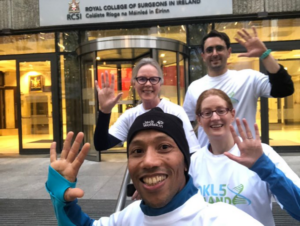
Dr Omar Mamad and the FutureNeuro Team completing the DDKL5 Run.
Case Study 3: Brain Health and Neurology Series for Educational Organizations
FutureNeuro Researchers were offered the opportunity to host a series of Brain Health and Neurology Webinars for Educational Organisations and to avail of the opportunity to engage educators in conversations with scientists about their research. The vision here is to promote awareness and understanding of Brain Health and current research initiatives in FutureNeuro – initially for educational organisations and later for sports organisations throughout the country. Further objectives include developing FutureNeuro Researchers skills to translate their research into “plain English”. Collaborative initiatives such as these are designed to educate, equip and empower the general public to engage and become involved with research and bridge the gap between patients/people with lived experience of neurological conditions/sports participants, their caregivers, clinicians, neuroscientists and the public. Equally, such researcher led initiatives addressing both public patient involvement and education and public engagement are greatly promoted and encouraged in FutureNeuro. One of our funded investigators, Professor Danny Costello presented a pilot webinar on epilepsy in both education and sports contexts.
The target group for the presentation was sports participants, educators, coaches, parents, FutureNeuro research community and members of the public. This webinar provided FutureNeuro Researchers with a platform to share their knowledge and research journey in a collaborative way. It also opened avenues for sports organizations and FutureNeuro staff to collaboratively develop and deliver Initiatives in education and public engagement going forward.
Reflective feedback was invited after the webinar. High rates of satisfaction were recorded from all of the participants with quotes from coaching participants as follows:
“Outstanding presentation, great to see the fear factor taken from epilepsy and sport”;
“Brilliant presenter, broke down the content into such an understandable way, we could do with so much more of this”.
A teacher/coach/hurler commented
“What a super presentation, everything was so clearly explained and all questions answered so well, I’ll be back for more”.
Feedback from a member of the FutureNeuro Research team “I really learned so much tonight from Danny, we need to create so much more webinars like this for the public. It’s this approach breaks down barriers between the research world and the real world.”
The success of this initiative will inform the education and public engagement of FutureNeuro researcher collaborations with The Local Sports partnerships and sports organizations going forward.
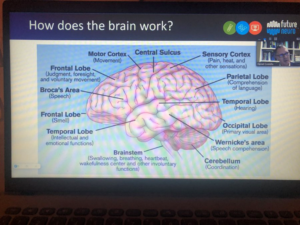
Professor Danny Costello Funded Investigator, presents on Epilepsy in an Education and Sporting Context.
Case study 4: Epilepsy in English (EiE) workshops
Vision and Objectives: The Epilepsy in English (EiE) workshops were designed to educate, equip and empower people living with epilepsy to engage and become involved with research and bridge the gap between people with the experience, their caregivers, clinicians and neuroscientists. The workshops built upon the successful EiE blog, started in 2018 by FutureNeuro MSCA fellow Dr Gareth Morris, where researchers explain complex publications in plain English ensuring their accessibility.
The target group for the workshops included patients and families of people with epilepsy, patient advocacy organisations, the FutureNeuro research community and members of the public. Feedback was sought and the following comment is illustrative of typical comments: ‘Gene Therapy sounds fascinating, will definitely make a huge difference in the lives of people with epilepsy. I will get in touch with my local politicians to lobby for more investment in epilepsy research’ Attendee of Gene Therapy workshop
Inputs: We co-designed of a series of four workshops together with Epilepsy Ireland, DCU PPI Ignite and a person living with epilepsy. Epilepsy Ireland facilitated the selection of the most relevant topics by surveying its members in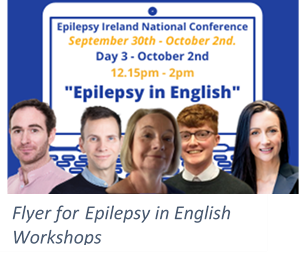 order to maximise relevance to patients. To maximise reach, we launched the workshops at the Epilepsy Ireland National Conference in October 2021. The workshops were delivered by 14 FutureNeuro team members along with 5 members of the clinical care network and three patient advocates. Following best practice in engaged research, the format started with a presentation by a researcher or clinician followed by moderated breakout rooms and a wrap-up Q&A. The workshops were originally planned as in-person events at four national locations where FutureNeuro had researcher presence. Due to COVID-19, we pivoted to an on-line format – while this reached a bigger population, feedback indicated a preference for in-person workshops. FutureNeuro and Epilepsy Ireland secured €42,000 SFI Discover funding to develop the series. This supported the development of an online platform, a series of animations to accompany the workshops and pre-recorded content.
order to maximise relevance to patients. To maximise reach, we launched the workshops at the Epilepsy Ireland National Conference in October 2021. The workshops were delivered by 14 FutureNeuro team members along with 5 members of the clinical care network and three patient advocates. Following best practice in engaged research, the format started with a presentation by a researcher or clinician followed by moderated breakout rooms and a wrap-up Q&A. The workshops were originally planned as in-person events at four national locations where FutureNeuro had researcher presence. Due to COVID-19, we pivoted to an on-line format – while this reached a bigger population, feedback indicated a preference for in-person workshops. FutureNeuro and Epilepsy Ireland secured €42,000 SFI Discover funding to develop the series. This supported the development of an online platform, a series of animations to accompany the workshops and pre-recorded content.
Outputs: The EiE workshops addressed Temporal Lobe Epilepsy, Sudden Unexpected Death in Epilepsy (SUDEP), Gene Therapy and Using Technology for Self-monitoring. Each session reached the maximum capacity of 25 people including people with epilepsy, family carers and engaged public. Dr Morris has a publication in preparation.
Outcomes and Evaluation: Epilepsy Ireland surveyed the participants and gathered input regarding format and topics. The participants highlighted the importance of extended Q&A sessions as they provided the opportunity to ask questions to researchers and clinicians. For researchers, the workshops provided direct input to research questions. We found the collaboration with a NGO (Epilepsy Ireland) particularly beneficial and a format we will apply to workshops in other disease areas.
